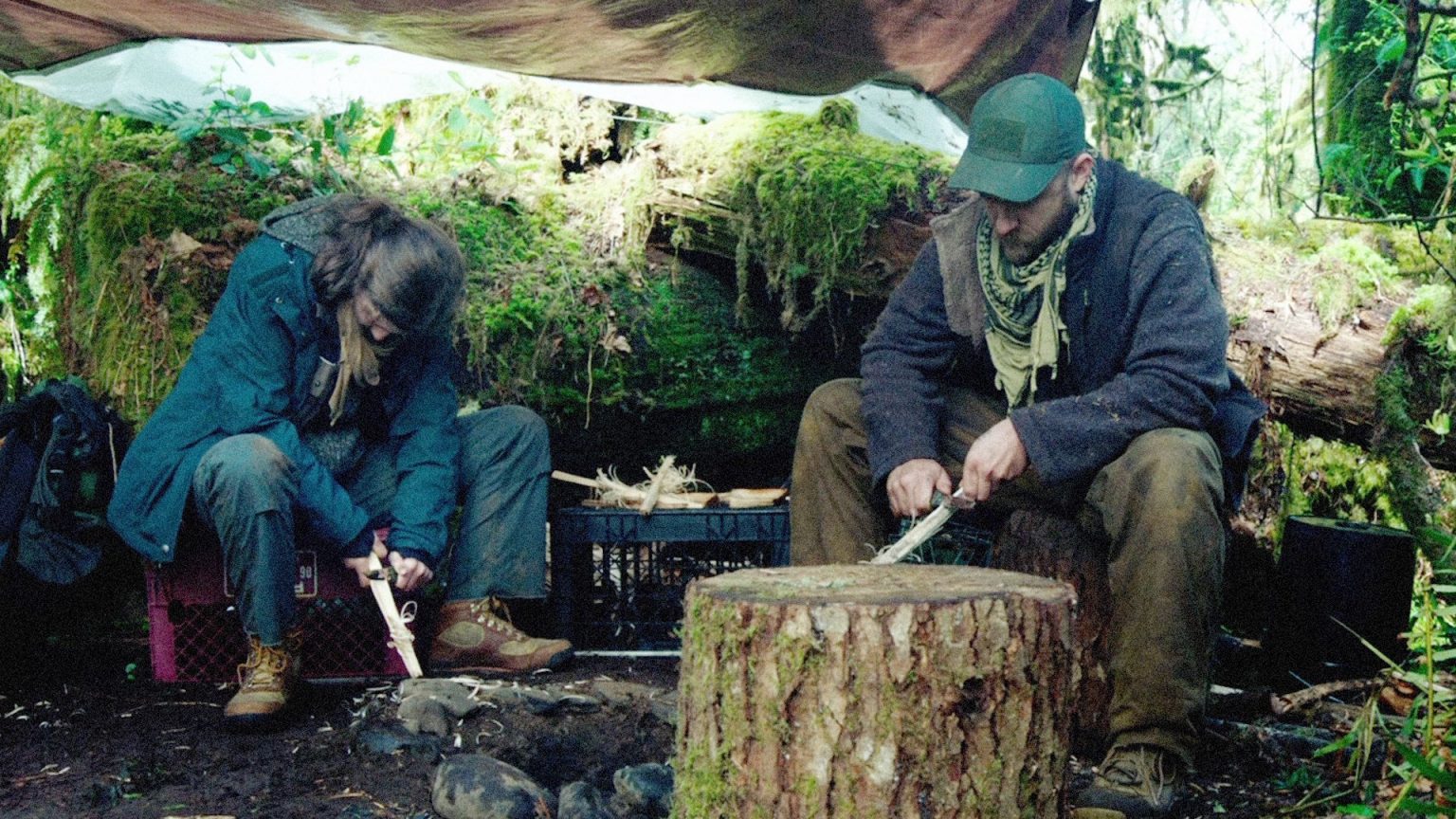The term “leave no trace” refers to the ethical code of the outdoors, which is about minimizing the impact on the environment: Respect the surrounding wildlife, dispose of all waste properly, and leave behind anything that you find. In an early scene in Debra Granik’s new feature, Leave No Trace — based on the novel, My Abandonment, by Peter Rock — it also means “cover your tracks.” By the end of this subtle and deeply affecting film, those words come to mean much more.
The tracks in question belong to Tom, a teenage girl who lives with her father, Will, off the grid in a forest (and national park) outside of Portland, Oregon. Will, played with moving intensity by Ben Foster, is a loving and devoted father intent on teaching Tom how to survive in the wilderness, both physically and mentally— which includes how to hide her tracks in the woods to avoid being discovered by the park rangers and other passersby. After all, living on public land is illegal. Tom, played by newcomer and soon-to-be star Thomasin Harcourt McKenzie, does well at hiding, but not well enough. She’s still learning, and Will quickly finds her.
This exercise, and the overall illegality of their lifestyle, belies just how idyllic and peaceful their existence can be. Michael McDonough’s cinematography follows them effortlessly through the lush, green forest, lingering hypnotically on little bits of wilderness (like a glistening spider’s web swaying in a breeze). Though Will and Tom have cultivated a sense of peace, their lives are not without struggle. Living in the wild is a challenge (just try building a fire in the rain, for example), and beyond the physical demands lie deeper conflicts. Will is a military veteran haunted by his past and, of course, there is the perpetual need to evade detection, which, soon enough, comes to a head.
Park rangers, accompanied by some government workers (presumably social services), discover Will and Tom. They take Will away in handcuffs and bring Tom to a temporary shelter for homeless youth. After some perfunctory evaluations, Will and Tom are reunited and, with the support of the representatives of the social service and some goodwill from locals, they are given a humble but pleasant-enough house adjacent to a tree farm. There are conditions to this new life, though: Will must work on the farm and Tom must enroll in school. They must reenter society.
Will struggles mightily to adjust and is uncompromising in his need to live cut off from society. Tom, on the other hand, feels more comfortable integrating and is intrigued by her taste of the “normal” life. These diverging interests begin to challenge Will and Tom’s deep bond and constitute the film’s central emotional conflict.
The movie paints a vivid portrait of an often-invisible slice of America: the types of characters who live on the fringes of society. We encounter veterans like Will, struggling to adapt in their own ways, and a variety of others who, for one reason or another, exist on the margins. These itinerant supporting players, each with their own meaningful micro-drama, complement the magnitude and strength of Foster and McKenzie’s performances. Foster, with his penchant for serious roles, further proves his worth as a performer — and a highly underrated one at that. Granik’s previous narrative feature, Winter’s Bone, but Jennifer Lawrence is on the road to stardom, and she is clearly adept at directing young women. As Tom, McKenzie displays a level of nuance and mature restraint that is certain to put her on the map and keep her there.
Although the film is in some ways about the alienating experiences of veterans returning home from combat, it avoids being too political or on-the-nose in its portrayal of that trauma. Will’s troubles are more sprawling than acute, which aids in maintaining the drama’s rich subtlety. There is a slight moment of revelation in which we learn more about the nature of Will’s past, but the experience veers away from melodrama.
Certain other elements do go underexplored: For example, we know very little about Tom’s mother, other than the fact that she died when Tom was very young. Still, this doesn’t necessarily feel like a lack of development. In fact, the sparse exposition actually works to keep us grounded in the present, with Will and Tom’s moment-to-moment experiences.
After Will and Tom move into their house, the story takes several more turns, but for the most part, they feel more like the gentle curves of a stream than abrupt plot twists. Each serves as a litmus test for just how badly Will needs to live apart from the world in order to stay afloat. Each moment challenges the strength of Will and Tom’s bond, and whether or not their increasingly separate identities can maintain a compatible lifestyle.
Early on in the film, while Will teaches Tom to hide her tracks, he makes a clicking sound with his mouth to which Tom responds with her own clicks. It’s as much a form of covert communication as it is a sign of father-daughter affection, as if to say, both literally and figuratively, “I’m here. Are you?” It’s a cute moment, one that you might not think much of it at first. That is until it happens again towards the end of the film, and we witness the wrenching manner in which a seemingly insignificant habit comes full circle. Like the film itself, it’s a simple and humble gesture, and it just might leave you transfixed with a much-needed dose of bittersweet tranquility…if you’re willing to let it.
Watch Now: For more films about the deep and powerful bonds between fathers and daughters, be sure to visit the Fandor library and check out Claire Denis’ 35 Shots of Rum and Daniel Auteuil’s The Well-Digger’s Daughter.




